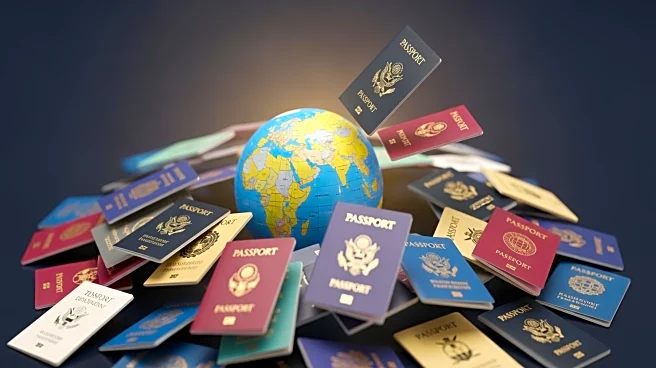What's Happening?
The latest Henley Passport Index has revealed a significant shift in global passport rankings, with the United States dropping out of the top 10 for the first time in the index's 20-year history. The U.S.
passport, which once held the number one position in 2014, now ranks 12th, tied with Malaysia. This ranking allows U.S. citizens visa-free access to 180 out of 227 destinations. The decline in ranking reflects changes in global travel dynamics and the increasing competitiveness of other nations' passports. The United Kingdom has also experienced a drop, moving from 6th to 8th place since July, despite having shared the top spot in 2015.
Why It's Important?
The decline in the U.S. passport's ranking could have implications for American travelers, potentially affecting their ease of access to international destinations. This shift may influence travel plans, as fewer visa-free options could lead to increased travel costs and planning complexities. The change also highlights the evolving nature of international relations and travel policies, as other countries strengthen their diplomatic ties and expand visa-free agreements. For the U.S., this development may prompt a reassessment of its travel and diplomatic strategies to regain a more favorable position in future rankings.
What's Next?
As the U.S. passport's ranking has fallen, there may be increased pressure on policymakers to negotiate more favorable travel agreements with other countries. This could involve diplomatic efforts to expand visa-free access for American citizens. Additionally, the travel industry might need to adapt to these changes by offering more comprehensive travel planning services to accommodate the new visa requirements. Travelers may also need to become more informed about visa processes and requirements for their desired destinations.
Beyond the Headlines
The shift in passport rankings could also reflect broader geopolitical trends, such as the rise of emerging economies and their increasing influence on global travel policies. This may lead to a more multipolar world where travel freedom is not dominated by traditional Western powers. The changes in rankings could also encourage countries to invest in improving their global image and diplomatic relations to enhance their citizens' travel freedom.









